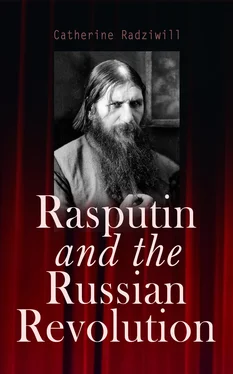Catherine Radziwill
Rasputin and the Russian Revolution
By A Contemporary Observer
e-artnow, 2022
Contact: info@e-artnow.org
EAN 4066338122810
Part I. Rasputin Part I. Rasputin Table of Contents
Introduction
Chapter I
Chapter II
Chapter III
Chapter IV
Chapter V
Chapter VI
Chapter VII
Chapter VIII
Chapter IX
Part II. The Great Revolution
Chapter I
Chapter II
Chapter III
Chapter IV
Chapter V
Part III. The Riddle of the Future
Conclusion
Table of Contents
Table of Contents
This exposé, based on facts which have come to my knowledge, though probably far from being complete, aims at depicting the recent state of things in Russia, and thus to explain how the great changes which have taken place in my country have been rendered possible. A lot of exaggerated tales have been put into circulation concerning the Empress Alexandra, the part she has played in the perturbations that have shaken Russia from one end to another and the extraordinary influence which, thanks to her and to her efforts in his behalf, the sinister personage called Rasputin came to acquire over public affairs in the vast empire reigned over by Nicholas II. for twenty-two years. A good many of these tales repose on nothing but imagination, but nevertheless it is unfortunately too true that it is to the conduct of the Empress, and to the part she attempted to play in the politics of the world, that the Romanoffs owe the loss of their throne.
Alexandra Feodorovna has been the evil genius of the dynasty whose head she married. Without her it is probable that most of the disasters that have overtaken the Russian armies would not have happened, and it is certain that the crown which had been worn by Peter the Great and by Catherine II. would not have been disgraced. She was totally unfit for the position to which chance had raised her, and she never was able to understand the character or the needs of the people over which she ruled.
Monstrously selfish, she never looked beyond matters purely personal to her or to her son, whom she idolized in an absurd manner. She, who had been reared in principles of true liberalism, who had had in her grandmother, the late Queen Victoria, a perfect example of a constitutional sovereign, became from the very first day of her arrival in Russia the enemy of every progress, of every attempt to civilise the nation which owned her for its Empress. She gave her confidence to the most ferocious reactionaries the country possessed. She tried, and in a certain degree succeeded, in inspiring in her husband the disdain of his people and the determination to uphold an autocratic system of government that ought to have been overturned and replaced by an enlightened one. Haughty by nature and by temperament, she had an unlimited confidence in her own abilities, and especially after she had become the mother of the son she had longed for during so many years, she came to believe that everything she wished or wanted to do had to be done and that her subjects were but her slaves. She had a strong will and much imperiousness in her character, and understood admirably the weak points in her husband, who became but a puppet in her hands.
* * *
She herself was but a plaything in the game of a few unscrupulous adventurers who used her for the furtherance of their own ambitious, money-grubbing schemes, and who, but for the unexpected events that led to the overthrow of the house of Romanoff, would in time have betrayed Russia into sullying her fair fame as well as her reputation in history.
* * *
Rasputin, about whom so much has been said, was but an incident in the course of a whole series of facts, all of them more or less disgraceful, and none of which had a single extenuating circumstance to put forward as an excuse for their perpetration.
* * *
He himself was far from being the remarkable individual he has been represented by some people, and had he been left alone it is likely that even if one had heard about him it would not have been for any length of time.
* * *
Those who hated him did so chiefly because they had not been able to obtain from him what they had wanted, and they applied themselves to paint him as much more dangerous than he really was. They did not know that he was but the mouthpiece of other people far cleverer and far more unscrupulous even than himself, who hid themselves behind him and who moved him as they would have done pawns in a game of chess according to their personal aims and wants. These people it was who nearly brought Russia to the verge of absolute ruin, and they would never have been able to rise to the power which they wielded had not the Empress lent herself to their schemes. Her absolute belief in the merits of the wandering preacher, thanks to his undoubted magnetic influence, contrived to get hold of her mind and to persuade her that so long as he was at her side nothing evil could befall her or her family.
It is not generally known outside of Russia that Alexandra Feodorovna despised her husband, and that she made no secret of the fact. She considered him as a weak individual, unable to give himself an account of what was going on around him, who had to be guided and never left to himself. Her flatterers, of whom she had many at a time, had persuaded her that she possessed all the genius and most of the qualities of Catherine II., and that she ought to follow the example of the latter by rallying around her a sufficient number of friends to effect a palace revolution which would transform her into the reigning sovereign of that Russia which she did not know and whose character she was unable to understand. Love for Nicholas II. she had never had, nor esteem for him, and from the very first moment of her marriage she had affected to treat him as a negligible quantity. But influence over him she had taken good care to acquire. She had jealously kept away from him all the people from whom he could have heard the truth or who could have signalled to him the dangers which his dynasty was running by the furtherance of a policy which had become loathsome to the country and on account of which the war with Germany had taken such an unexpected and dangerous course.
The Empress, like all stupid people, and her stupidity has not been denied, even by her best friends, believed that one could rule a nation by terror. She, therefore, always interposed herself whenever Nicholas II. was induced to adopt a more liberal system of government and urged him to subdue by force aspirations it would have been far better for him to have encouraged. She had listened to all the representatives of that detestable old bureaucratic system which gave to the police the sole right to dispose of people’s lives and which relied on Siberia and the knout to keep in order an aggrieved country eager to be admitted to the circle of civilised European nations.
Without her and without her absurd fears, it is likely that the first Duma would not have been dissolved. Without her entreaties, it is probable that the troops composing the garrison at St. Petersburg would not have been commanded to fire at the peaceful population of the capital on that January day when, headed by the priest Gapone, it had repaired to the Winter Palace to lay its wrongs before the Czar, whom it still worshipped at that time. She was at the bottom of every tyrannical action which took place during the reign of Nicholas II. And lately she was the moving spirit in the campaign, engineered by the friends of Rasputin, to conclude a separate peace with Germany.
Читать дальше












